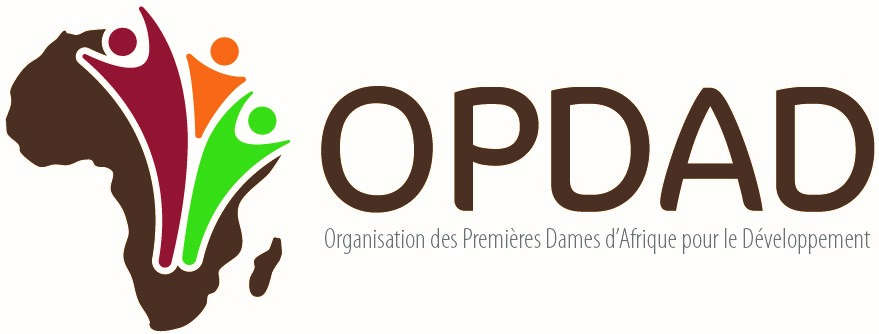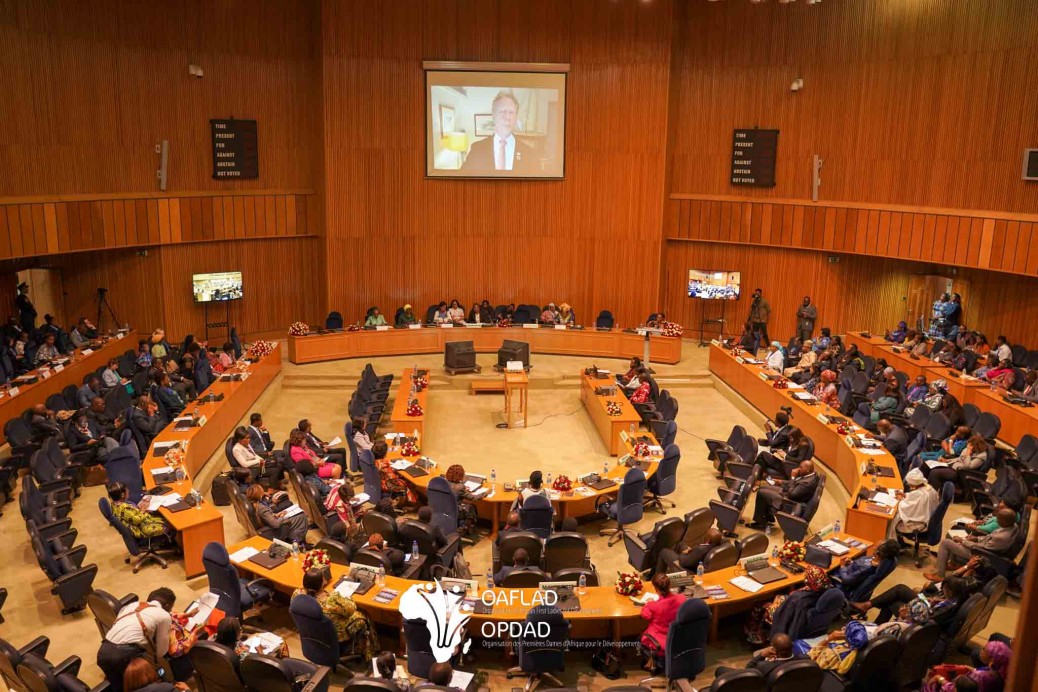The AU Commission (AUC), under the leadership of the Department of Health, Humanitarian Affairs and Social Development held a virtual policy dialogue titled, “Closing the Gap: How Women’s Leadership Strengthens Health Systems in Africa,” to commemorate the 2024 International Women’s Day on Friday 08 March from 10 am – 12noon (GMT+3).
Speakers included Ms. Prudence Ngwenya Director of Women, Gender, and Youth Directorate (WGYD), AU Commission; H.E. Amb. Minata Samate Cessouma, Commissioner for Health, Humanitarian Affairs and Social Development, AU Commission; H.E Mrs. Denise Nyakéru Tshisekedi, the First Lady of the Democratic Republic of the Congo and Vice President, Organization of African First Ladies for Development (OAFLAD); Hon. Mrs. Lúcia Maria Mendes Gonçalves dos Passos who is the Acting President of the Pan-African Parliament; Ms. Angela Naa Afoley Odai, the Acting Head of the Diaspora Division, AU Commission, and Ms. Rhoda Igweta, Regional Director for Public Policy and Advocacy at the Elizabeth Glaser Pediatric AIDS Foundation (EGPAF). They shared the respective efforts to empower African women to lead and extend recommendations for health system strengthening in Africa.
Since early civilizations, women have played an active role in health system strengthening and disease elimination, as nurses, midwives, healers and more. However, when medicine was formalized as a profession, women were banned from medical education and practice and had to fight back. Today, women hold around 70% of health worker jobs globally; and over 80% of nursing and midwifery roles. Collectively, they make most health purchasing and usage decisions. A vital role in the health sector, as health workers, caregivers, decision-makers, and advocates. However, they face many barriers and challenges that limit their full participation and leadership in health systems. The existent limitations ought to be unpacked and addressed to empower women to play their respective roles in health promotion hence the vitality of commemorating International Women’s Day.
The International Women’s Day 2024, is being commemorated under the theme: Invest in Women: Accelerate Progress (#InvestInWomen). Despite women’s contribution to health systems and supporting the realization of health for all, women hold only 25% of senior leadership roles in the sector. If leadership roles were allocated on merit, then since women are 70% of health workers, 70% of health sector leaders would be women. This is the opposite of the current situation where men hold 75% of leadership roles but are only 30% of health workers. This gendered leadership gap in healthcare needs to be filled among other challenges, hence the cruciality of bringing women leaders together for health policy dialogue this International Women’s Day.
“I can attest that women’s leadership is essential for advancing health policy, innovation, research, development, and health systems strengthening by promoting inclusivity, addressing gender disparities, advocating for women’s health, fostering collaboration, promoting equity, and enhancing organizational performance. Women leaders bring diverse perspectives and experiences to the table, ensuring that policies, innovations, and research initiatives are inclusive and address the unique needs of women and girls, addressing issues such as maternal health, reproductive rights, and gender-based violence. I thank all women playing a vital role in the health sector, as health workers, caregivers, decision-makers, and advocates. Every generation starts and grows because of a woman – we need you. I reiterate my commitment to supporting and empowering women to play their part in the actualization of the AU Agenda 2063, Africa Health Strategy (2016-2030) and the continent’s broader health priorities towards the attainment of a healthy, prosperous Africa,” reiterated H.E. Amb. Minata Samate Cessouma, Commissioner for Health, Humanitarian Affairs and Social Development African Union Commission
“I would like to reiterate that OAFLAD remains a strong supporter of the continental agenda led by the African Union Commission’s Department of Health, Humanitarian Affairs and Social Development. Over the years, we have advocated strengthening the capacity of OPDAD member states to implement effective responses to HIV and AIDS, maternal, newborn and child health, and non-communicable diseases. Our Unification Campaign, #WeAreEqual launched in July 2023, has brought together Africa’s First Ladies, their partners, and allies to advance gender equality and close the gender gap across the continent. The campaign reminds us of an essential truth: we are equal – and always have been. Our healthcare, education, economic opportunities, and freedom from violence should also be equal. In my home country, the Democratic Republic of Congo, the government is fully committed to reducing the gender gap in the health and education systems. We know that girls and women are the drivers of sustainable development and powerful agents of change. If we work together and commit to putting girls and women first, we can – and will – achieve lasting change for everyone,” echoed H.E Mrs. Denise Nyakéru Tshisekedi, First Lady of the Democratic Republic of the Congo and Vice President, OAFLAD
“We must acknowledge the essential role played by women’s leadership in strengthening our healthcare systems. Their leadership is characterized by empathy, collaboration, and innovation. It has been proven that when women lead, healthcare systems become more equitable, the quality of care improves, and communities prosper. The Pan-African Parliament has always been at the forefront of defending equality and justice on the continent. Our commitment to gender equality is a strategic decision to harness the full potential of our societies. As part of its missions, the Parliament, through its Committee on Health and the work of its Women’s Caucus, actively promotes and facilitates the implementation of African Union health policies by developing model laws to consolidate best practices on the continent. Closing the gap requires invigorating our health systems with the unique perspectives and skills that women bring to the forefront. The actions taken by women representatives in the Pan-African Parliament aim to promote policies and programs that not only recognize the worth of women but also amplify their voices and magnify their impact. The legislative arm of the Union will continue to serve as a platform for African legislative dialogue, offering women the opportunity to shape health policies with a cross-border impact on public health,” stated Hon. Mrs. Lúcia Maria Mendes Gonçalves dos Passos, Acting President of the Pan-African Parliament
“Investing in women’s rights, gender-responsive financing, green economy, and change-makers among other progressive reforms is not only a moral imperative but also a smart economic decision which will only succeed if we take a joint approach. Empowering women economically and socially has numerous benefits, including fostering sustainable development, reducing poverty, and promoting overall societal progress. When women have equal access to education, healthcare, employment, and decision-making opportunities, they can contribute more effectively to their communities and economies. Together, let us celebrate the achievements of women leaders in global health and recommit ourselves to the shared goal of creating a brighter, healthier future for generations to come,” stated Ms. Prudence Ngwenya, Director of WGYD, AU Commission
“We collectively need to ask ourselves how we contribute to creating space for women to collaborate, network, share knowledge and foster solidarity. Empowering women as agents of change begins with looking at what is needed at the community level. During COVID-19, for example, there was the increased need for telemedicine and traditional medicine hence an opportunity for women leaders in healthcare to expand the modes and structures of healthcare delivery. We could also explore opportunities for women to co-author articles on access to health care so they can share their unique experiences with the world,” encouraged Ms. Angela Naa Afoley Odai, Acting Head of the Diaspora Division, AU Commission
“Women’s leadership gave birth to the organization I now work for – The Elizabeth Glaser Pediatric AIDS Foundation. The foundation, which began with three mothers around a kitchen table, is now the leading global non-profit dedicated to eliminating pediatric HIV and AIDS. We are driven to see a world where no other mother, child, or family is devastated by this disease. None of the impact we have had over the last 35 years would be possible without women who are in the community, in health facilities, as peers, mentors, mothers, sisters, allies, and friends. These are the women who contribute to our continent’s development and strengthen our health systems. EGPAF is dedicated to ensuring a woman’s journey through the HIV-care continuum is met with responsible, knowledgeable, and caring health programs that respond to the needs of women and girls of all ages,” highlighted Ms. Rhoda Igweta, Regional Director for Public Policy and Advocacy, EGPAF.
The Africa Health Strategy (2016 -2030), Catalytic Framework to end AIDS, TB, and Malaria by 2030, and 2030 Agenda for Sustainable Development have strategic objectives which include strengthening leadership and governance and empowering women, youth and adolescents to expand social protection to address equity. Additionally, the Strategy for Gender Equality & Women’s Empowerment (GEWE) (2018-2028) sets forth a plan to realize Aspiration 6 of the AU Agenda 2063: “An Africa where development is people-driven, relying upon the potential offered by people, especially its women and youth and caring for children,”. Summarily, the AU recognizes the importance of gender equality and women’s empowerment for achieving the health and development goals of the continent.
The event brought together representatives from AU Member States, Specialized Organs, Regional Economic Communities (RECs), UN agencies and Development Partners, Civil Society Organs, and more, in the fields of GEWE and health systems strengthening. The recommendations and commitments for strengthening African women’s leadership in health systems shared during the meeting will be disseminated to all AU Member States after the session.

